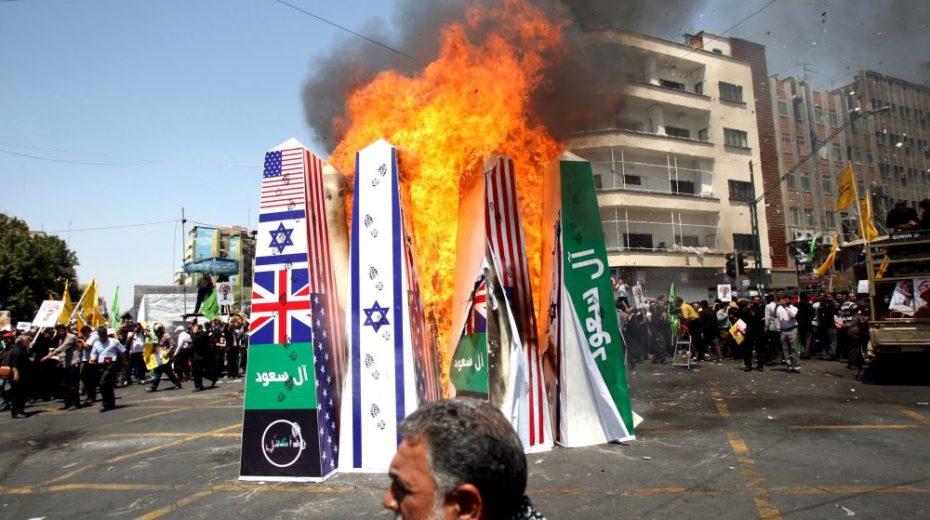Will Quiet Middle East Last? Or Is It Lull Before Next Storm?
Authored by Martin Sieff via The Strategic Culture Foundation,
Across the Middle East, the coronavirus is stirring up both upheavals and more subtle changes from Tel Aviv to Riyadh, little reported and when covered little understood in the Western media.
In Israel, the virus has enabled that master political magician Prime Minister Benjamin Netanyahu to pull off yet another spectacular escape as improbable as any in a James Bond or Star Wars movie to remain in power indefinitely.
After matching him in three successive national elections, Blue and White opposition leader, former Army Chief of Staff retired Lieutenant General Benny Gantz finally blinked: Because of the coronavirus pandemic crisis, he agreed to enter into a coalition with Netanyahu leading it for the first 18 months.
This is more than enough time for Netanyahu, a master political infighter and intriguer to splinter Blue and White into fragments. Indeed, Gantz has already done the biggest part of the job for him.
His own top allies in the new party, former Finance Minister Yair Lapid and former Defense Minister and Army Chief of Staff Moshe Ya’alon both firmly opposed any agreement to compromise with Netanyahu refused to go along with it. Currently, even Gantz and Netanyahu have not yet finalized their agreement, but Netanyahu has seized the initiative from him. His record in power over the past decade suggests he will not release it easily.
Netanyahu can at least boast that his lockdown has kept Israel relatively isolated from the pandemic. That is not the case in Iran, which boasts close trade and energy ties with China and where the virus has been raging ferociously.
That of course, is also the case in the United States. Extremist US hawks have been gloating – hopefully – that the crisis in Iran might discredit and topple the government there. That seems very unlikely at the moment.
What remains possible is that if the virus does significantly “decapitate” the current leadership in Tehran, more extreme and unpredictable rather than more moderate figures may take over more ready to act on provocations from Washington rather than play them down.
In Saudi Arabia, the virus may also have unpredictable “cushion shot” – surprise ricochet – effects.
Saudi Arabia’s elite King Feisal Specialist Hospital, which treats members of the kingdom’s royal family, is said to be on “high alert” as senior members of the Al Saud clan become infected with COVID-19. As many as 150 royals in the kingdom are now believed to have contracted the virus, according to a report in the New York Times.
The highest royal to be infected so far is Prince Faisal bin Bandar bin Abdulaziz al Saud the governor of the capital Riyadh who is in his 70s and therefore at increased risk. Worse yet, at the time of writing, he is said to be in intensive care.
King Salman bin Abdulaziz, aged 84 is believed to have taken refuge on an island palace near the city of Jeddah on the Red Sea along with Crown Prince Mohamed Bin Salman on the same coast with his ministers. But these moves , if extended, may isolate them dangerously from the national centers of power.
Bin Salman was already in an uncharacteristic subdued mood before the pandemic hit as his oil price war on Russia and the United States backfired disastrously. Since then, he has been busy mending bridges with Moscow and appears close to completing a deal on reducing oil production with the Kremlin.
However, the prolonged slump in global oil prices will certainly continue and may intensify. Russia is in a sound position to ride out such a longer-term wave: Saudi Arabia is not.
If on top of all this, Bin Salman himself should contract the coronavirus, he has made so many enemies across society from royal to business circles with his reckless, warmongering and spendthrift policies that any sign of personal vulnerability could launch an attempt to drive him from power. He has almost certainly survived at least one assassination attempt already.
Only last month, Bin Salman ordered the arrest of two senior members of the royal family – Prince Ahmed bin Abdulaziz, the younger brother of King Salman, and Mohammed bin Nayef, his first cousin and the king’s nephew.
Like Netanyahu, Bin Salman has good reason for caution rather than dangerous adventures as both men struggle to maintain their increasingly precarious bases of power. That should point to a quieter, more peaceful region, at least in the short term.
But as I learned a long time ago in my native North Belfast, no time is more dangerous than when things get too quiet in a dangerous neighborhood.
Tyler Durden
Wed, 04/15/2020 – 02:00
